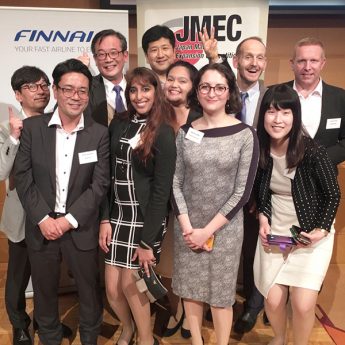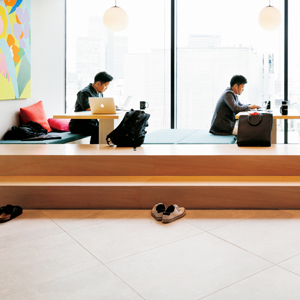With an economy valued at more than £601bn a year—significantly more than the national global domestic product (GDP) of Switzerland and closing in on that of the Netherlands—the seven prefectures that make up the Kansai region have long been the industrial heartland of Japan. Many companies that started out here as small, family-run businesses have since gone on to be household names around the world—Kyocera Corp, Horiba Ltd and Sysmex Corp to name but a few.
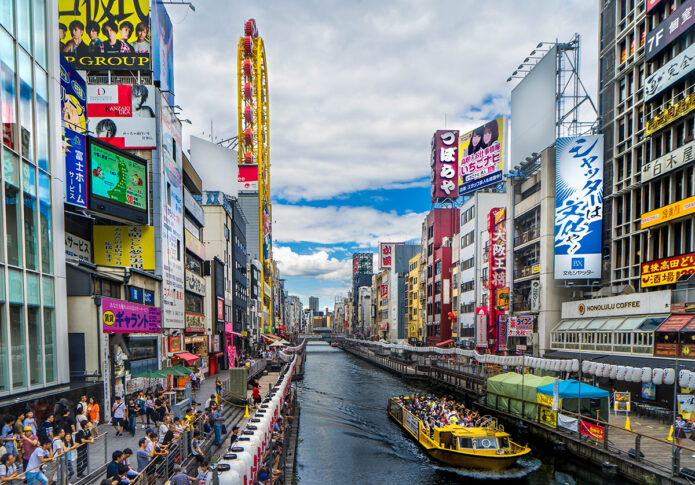
Osaka is an ideal location for global firms in the electronics, pharma, device, chemical, food and construction industries.
Kansai’s attraction
While domestic firms are looking to use Kansai as a springboard to increased exports and a greater presence in foreign markets—notably the UK—a growing number of British firms are also selecting this region as the centre of their operations in Japan.
No fewer than 20 British firms have chosen to have their Japan head offices in Kansai, with a study by Japanese Ministry of Economy, Trade and Industry confirming that they are attracted to the region by the:
- High number of university and research institute clusters
- Opportunities in the emerging areas of green innovation and the life sciences
- Diverse range of industries and a track record of entrepreneurship
Other appealing factors include:
- Kansai’s proximity to other key markets in the Asia-Pacific region
- Excellent international air and sea links
- Central location in Japan with road and rail links to the rest of the country
- Support for foreign firms considering setting up operations in the region
British presence
One of the biggest British brands to choose Kansai is Cambridge-based pharmaceutical giant AstraZeneca plc, which was originally set up as Fujisawa-Astra in Osaka in 1975 before becoming AstraZeneca in 2000.
“We believe Osaka is a big and very important area and we want to contribute to the local community and work closely with Osaka Prefecture”, said Sayuri Takimoto, associate director of government affairs for the company. 
AstraZeneca signed a comprehensive partnership agreement with the prefecture in January to work on the six priority areas of health, the promotion of diversity and inclusion, the environment, regional revitalisation, disaster prevention and children and welfare. Being in Kansai is ideal for a company such as AstraZeneca, Takimoto said.
“There are many good medical and pharmaceutical universities in Kansai and that is a great opportunity for us to acquire talent”, she told BCCJ ACUMEN. “Kansai is also located in the centre of Japan, the region has an international airport and many international schools, and that helps us to be nationality-diverse”.
The region also benefits from world-class infrastructure and medical care, making it an appealing place for people to live. Kansai also has a reputation for a culture that is distinct from the rest of Japan—a higher degree of independence and openness to embracing change and innovation. Focusing on the therapeutic areas of oncology, cardiovascular, renal and metabolism complaints, as well as respiratory illnesses and immunology, the company has delivered 16 products to the Japanese market in the last three years, has played a leading role in the fight against the coronavirus pandemic and is on course to launch another 30 products in Japan over the next three years.
Its plant in Maibara, Shiga Prefecture, delivers products for the Japanese market, with Takimoto insisting that the company is “committed to being the key driver of healthcare innovation”.
Differing markets
Plenty of Japanese companies with roots in Kansai are leveraging the region’s attributes to expand overseas, with many looking to enter the UK market, or build on existing operations in the country. The UK will become even more appealing as a business destination as soon as measures are completed to permit Britain to join the 11-nation Comprehensive and Progressive Agreement for Trans-Pacific Partnership (CPTPP).
Toridoll Holdings Corp started out as a single yakitori izakaya in Hyogo Prefecture as recently as 1985 and launched the Marugame Seimen brand of udon noodles in 2000. In less than a decade, the company had established operations in Hawaii, quickly followed by units in Hong Kong, China, Taiwan, Russia, Vietnam, Cambodia, Philippines, and mainland USA. In 2021, Marugame Udon (Europe) Ltd opened in the UK.
 “We opened our first Marugame Udon restaurant in the UK in July, close to Liverpool Street Station in London, followed by a second location at The O2 Arena in October, a third location in Canary in December and a fourth in St. Christopher’s Place in January”, said Satoshi Suga, head of global expansion of the brand. Despite something of a pall hanging over the global economy as a result of the coronavirus pandemic and, more specifically, over the UK due to fears surrounding Brexit, Toridoll has big plans for the UK.
“We opened our first Marugame Udon restaurant in the UK in July, close to Liverpool Street Station in London, followed by a second location at The O2 Arena in October, a third location in Canary in December and a fourth in St. Christopher’s Place in January”, said Satoshi Suga, head of global expansion of the brand. Despite something of a pall hanging over the global economy as a result of the coronavirus pandemic and, more specifically, over the UK due to fears surrounding Brexit, Toridoll has big plans for the UK.
“Four openings in less than six months in a new market is relatively fast and we plan to accelerate the speed of expansion in the UK over the coming months and years”, said Suga.
“Asia is definitely the biggest market for us right now and will remain so for the foreseeable future, but the European market is a very high priority”, Suga said. “The Marugame brand is expected to roll out strongly in Europe, but our success in the UK will determine our success in the European market. That is why it is of the highest priority to Toridoll”.
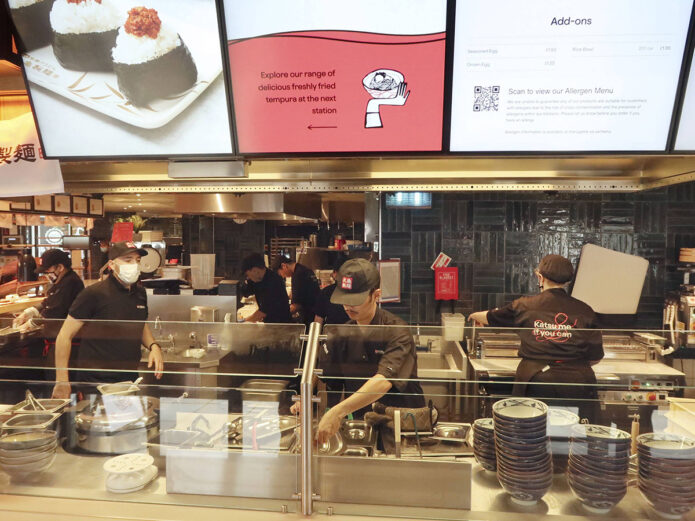
Marugame Udon opened its first London restaurant in July 2021.
Life sciences
Another innovative firm to emerge from Hyogo Prefecture is Sysmex Corporation, which develops and manufactures diagnostic instruments and reagents, with exports making up a significant part of its operations.
 “Kansai is a large economic zone with some top-class universities and a variety of healthcare and technology-oriented companies”, said Kenji Tsujimoto, executive vice president of Sysmex’s Technology Strategy Division. “To leverage those unique strengths, we are building collaborations with these organisations to create value in healthcare and a culture of ‘open innovation’”.
“Kansai is a large economic zone with some top-class universities and a variety of healthcare and technology-oriented companies”, said Kenji Tsujimoto, executive vice president of Sysmex’s Technology Strategy Division. “To leverage those unique strengths, we are building collaborations with these organisations to create value in healthcare and a culture of ‘open innovation’”.
And while in the past it might have been more important for companies to base themselves in Tokyo for access to government ministries, partners and clients, Sysmex believes the pandemic has hastened change in the way in which corporations and people work.
“In the post-Covid-19 society, we believe that such differences will be much less significant because of the adoption of new business practices, such as enhanced remote communication”, Tsujimoto said. Sysmex products that are manufactured in the Kansai region are distributed at home and in markets around the world, through the company’s network of more than 60 overseas affiliates. The company exports to more than 190 countries and regions.
The UK is among those destinations through a direct sales network, while the company has also acquired UK-based genomics company Oxford Gene Technology to enhance its presence in the molecular diagnostics sector. Underlining the importance of links between Kansai and the UK, Sysmex Group also opened a research and development (R&D) centre in Cambridge in 2020 to access British innovations in the life sciences and healthcare.
“The Sysmex group would like to enhance our R&D capabilities in the UK and we are also keen to deliver diagnostics solutions that fit the unique healthcare system in the UK”, Tsujimoto said.
“The UK is a world-leader in innovation in these areas, with prompt and effective actions for the Covid-19 pandemic one of the latest examples”.
Japanese exports
Kyoto-based Horiba Ltd is another regional powerhouse that has invested in the UK, acquiring Mira Ltd in July 2015. Horiba controls about 80 percent of the global market for precision instruments to measure and analyse automobile exhaust gas and has extensive operations in the semiconductor, environmental, medical and scientific sectors, with the acquisition of Nuneaton-headquartered Mira convenient for the UK’s automobile sector, not only to the UK car makers but also to the constructors of cars for Formula 1 and other motor sports.
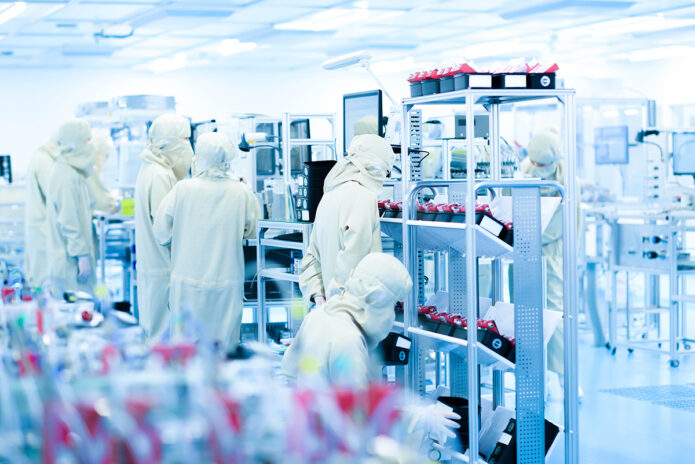
Horiba has 17 analysis and application laboratories in 10 countries.
 “Our business base in the UK is and will remain very important to us”, said Tetsuhiro Habe, manager of the Corporate Control Department. However, he expressed concern about the potential negative impact of Brexit on the company’s UK operations, including the European Union imposing duties on imports and exports and requirements for new licenses.
“Our business base in the UK is and will remain very important to us”, said Tetsuhiro Habe, manager of the Corporate Control Department. However, he expressed concern about the potential negative impact of Brexit on the company’s UK operations, including the European Union imposing duties on imports and exports and requirements for new licenses.
Horiba has two additional affiliates in the UK and intends to build on its strong links with a network of academic and research and development institutions in Kansai to build its business into new markets, including China and India, Habe said.
One of the largest firms to emerge from the Kansai region is Kyocera Corp, which started as an industrial ceramics business in Kyoto in 1959 but now has 16 plants across Japan and 307 group companies around the world. Several of those firms are in the UK, including Kyocera AVX Ltd, which manufactures multi-layer ceramic capacitor for the global satellite and automotive industry sectors in Coleraine, Northern Ireland, and Kyocera Document Solutions Ltd, which has been providing copiers, printers and related services in the UK since 1988.
“Due to rapid technological advances and the digital transformation, customers’ needs are becoming more diverse, while the business environment has also been significantly affected by the Covid-19 pandemic”, said Kenichi Hara, a spokesman for the company.
“Kyocera has consolidated its businesses into three segments starting this year to better leverage our diverse technological capabilities and enable each business to implement strategic initiatives more rapidly”, he said. “At production sites, we have improved productivity and promoted production automation, aiming to prepare for labour shortages that may become a concern in the future.
“At the same time, we aim to develop technologies and products that solve various social issues and promote training for junior staff members to pass on our technologies and business know-how to the next generation”.
Kyocera anticipates demand for 5G- and semiconductor-related products to remain strong, both in Japan and globally, while Hara emphasises the ongoing importance of its operations in the UK.
“The world is changing rapidly, with complex and almost irreversible effects on society, businesses and industries”, he said. “Climate change, connectivity and increased energy consumption are examples of such long-term transformative forces. Kyocera aims to actively develop key technologies that help solve the challenges facing the UK market”.

